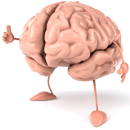 B12, which is also referred to as cobalamin, is an essential water-soluble vitamin. B12 is required for healthy red blood cells, DNA synthesis, cell replication, fatty acid metabolism, amino acid synthesis and a healthy nervous system. In addition, recent research conducted at Rush University Medical Center in Chicago, has found that B12 also plays a substantial role in the health of your brain and may even help to prevent brain atrophy and Alzheimer’s disease.
B12, which is also referred to as cobalamin, is an essential water-soluble vitamin. B12 is required for healthy red blood cells, DNA synthesis, cell replication, fatty acid metabolism, amino acid synthesis and a healthy nervous system. In addition, recent research conducted at Rush University Medical Center in Chicago, has found that B12 also plays a substantial role in the health of your brain and may even help to prevent brain atrophy and Alzheimer’s disease.
B12 for Better Memory and Increased Cognitive Function
Rush University conducted a four year long study on 121 participants over the age of 65, the results of which were published in the September 27th issue of the medical journal of The American Academy of Neurology. The participants had blood tests to measure their levels of B12 and they also took tests to measure their cognitive skills and memory. The study found that the individuals with higher B12 levels had better memory skills. Conversely, the individuals with lower levels of B12, tended to have problems with their thinking abilities and they scored lower on cognitive tests. What’s more, MRI scans taken during this study, found that a B12 deficiency was associated with shrinkage and consequently a smaller total brain volume.
B12 and Alzheimer’s disease
Advertisement
According to a study conducted at the Karolinska Institute in Sweden, B12 may also help to reduce your risk for developing Alzheimer’s disease. The seven year study, involved 271 healthy individuals over the age of 65. The researchers found that low levels of active B12 in the body, increased an individual’s risk for Alzheimer’s disease and other forms of dementia. The study also found that B12 helps to lower the blood concentration of homocysteine. This is beneficial because high homocysteine levels have been linked to accelerated brain shrinkage and a reduction in cognitive abilities.
What You Need to Know About B12 Deficiency
A B12 deficiency is a very serious disorder that will not only increase your risk for Alzheimer’s disease, if left untreated, it can also lead to severe neurological damage and cardiovascular disease. B12 is found primarily in animal foods such as meat, fish, eggs and dairy and the best sources include beef and beef liver, clams, salmon, trout and fortified breakfast cereals. According to Dr. Hass in his book “Staying Healthy with Nutrition,” B12 is one of the most difficult vitamins to absorb in the body and strict vegetarianism, alcoholism, malabsorption issues, Crohn’s disease, gastrointestinal infection, aging and stress can all lead to a B12 deficiency,.” If you fall into one or more of these categories, you may want to talk to your doctor about getting you B12 blood levels checked. Some common symptoms associated with B12 deficiency include: tiredness, lack of energy, diarrhea or constipation, loss of appetite, pale skin, problems concentrating, and a swollen, red tongue. Luckily a B12 deficiency is easily remedied, as B12 supplements are readily available and many healthcare practitioners offer B12 injections for those who are diagnosed as deficient.
